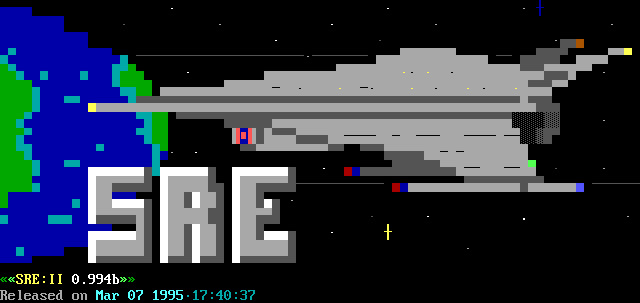BBS door games: Social Gaming innovation from the 1980s
I was always more of a Barren Realms Elite fan, but this picture was cooler!
And now you learn how I spent my childhood…
Some of the fondest memories from my childhood are playing BBS door games. Back before the web existed, I was a 10 year old kid in Seattle dialing into 3 or 4 different different BBSes using a pirated version of Procomm Plus. There, I found that you could download all sorts of awesome products (though in 20 different parts, which you had to put back together), and more importantly, they had the ability to launch “door games” like Tradewars 2002, Legend of the Red Dragon, Barren Realms Elite, and a number of other games I grew to love. I spent so many hours tying up the phone line after getting back from school that eventually my parents banned me from playing these games – but that only convinced me to set an alarm for 3am to wake up in the middle of the night to play!
Furthermore, it became a critical thing in my life to get all my friends from school to also play these games with me. Together, we’d team up into a powerful, coordinated unit, and dominate the other players on the BBS and regional network. (Or at least that was the plan) Eventually years passed, I learned the internet was more than gopher, and I moved on to better and more powerful massively multiplayer games.
It’s obvious, in retrospect, that a lot of the door games that existed 20 years ago pioneered a lot of the same techniques that social games use today. Let’s drill into a bunch of these similarities, covering the following topics:
- Door games are the “apps” to the BBS platform
- Social gameplay with friends and neighbors
- Turn-based, RPG-like gameplay
- Low-tech graphical experiences, delivered as a persistent social experience
If I’m missing anything, please leave a comment! Anyway, let’s get started…
Door games are the “apps” to the BBS platform
First, let me describe what a BBS actually is – you can read a more official version on Wikipedia here. Anyone with a phone line, modem, and computer running the right software could start up a BBS. The software would tell the computer, when it received a call, to automatically pick up the line and start talking to the computer on the other end. On the other side, anyone could dial into the BBS with the right terminal software and once the connection was established, you’d get a screen that looked something like this:

On these BBSes, you’d typically find a couple different sections:
- Private communication (reading and writing messages)
- Public communication (message boards)
- File sharing (downloading and uploading)
- External applications, including Door games
The external applications were integrated with the BBS as described by Wikipedia:
The BBS software starts the external program, and the door system passes data back and forth between the door program, the BBS, and the remote user. To supply the door program with the user’s information (such as the user’s alias and the amount of time they had spent online), the BBS software creates a dropfile containing information for the program to read.
This “dropfile” typically contained all the user information, so rather than the standard API where the app asks for that information, instead it was provided in one big file. The door game would then parse this data and use it for the game. For the extra nerdtastic detail, you can go here for the dropfile specs.
Now of course this process of extending the BBS’s functionality isn’t as flexible as things are now – after all, you couldn’t just upload a new Door game to a BBS and get it running. You also couldn’t update your game and instantly propagate the new version out to all the users. But the central idea is still the same.
Social gameplay with friends and neighbors
One of the interesting properties of BBSes is that because they are all accessed by phone, and you don’t want to pay long-distance bills, you end up dialing into BBSes in your own area code. For me, that was 206, and it means that I was mostly gaming with people in my same regional area. Similarly, I convinced all my friends to also dial into the same BBSes and play games with me. For the games that had leaderboards and user-to-user interaction, it was easy to feel the same fun game-like motivations that make social gaming work today.
As an aside, while doing research for this blog post, I found this funny ASCII based dating site with Myers-Briggs based writing, and a Wall!


You can tell from the number of dudes on the screen above that the world of lonely nerds has not changed much over the last 20 years.
Turn-based, RPG-like gameplay
One of the big design challenges for any BBS game is that you want to encourage social gameplay, yet it can’t be real time. This is because, of course, people can’t be logged in to the same BBS simultaneously unless the BBS had a ton of different phone lines (not likely). As a result, each of the Door games had to support an social, asynchronous play style that allowed people to dial in one after the other and still engage.
The way that was done depended on the game, of course, but usually combined a mix of computer players (aka NPCs) and “slow” real-time action where each loop of action lasted a day. Then on any given day, you are given a number of turns which you can expend. Once you play these turns, then you need to wait until the next day to get more turns. This made it so that for a game like Tradewars 2002, you can log in, do your trading/mining/attacking, and interact with computer-controlled characters. If you encounter another player’s ship, then you can interact with them with the computer taking control of the other player, so when attacking them, they will automatically defend.
Some of these games played very much like RPGs, with levels, currency, monsters, swords, quests, and the usual mechanics. One of the most popular games was called The Legend of the Red Dragon:

Having the combination of social gameplay with the traditional RPG mechanics created a rich world that allowed for months of play time.
Low-tech graphical experiences, delivered as a persistent social experience
You may notice from all of these screenshots that these games are very, very basic. Many of my friends at the time criticized the simplicity of the gameplay, only to be sucked in for social reasons :-) Similar to the current incarnation of social gaming, the emphasis is not on graphics. The primary advantages of a persistent, continually updated world with social gameplay far outweighed the fact that downloadable single player games had much better graphics. Of course I still downloaded and played Wolfenstein and Doom when it first came out, but throughout that time, I stilled played BBS games.
If there’s one thing to be learned from the BBS games and their related cousins, MUDs, is that great social interactions can trump pretty much everything else. Of course the products that can deliver higher production values and great social experiences are even better off.
It was fun to write this article! Such a blast from the past. Hope you share your memories of BBSes in the comments :-)
Want more?
If you liked this post, please subscribe or follow me on Twitter. You can also find more essays here.
(This blog was republished by the excellent blog Inside Social Gaming)
PS. Get new updates/analysis on tech and startupsI write a high-quality, weekly newsletter covering what's happening in Silicon Valley, focused on startups, marketing, and mobile.
Views expressed in “content” (including posts, podcasts, videos) linked on this website or posted in social media and other platforms (collectively, “content distribution outlets”) are my own and are not the views of AH Capital Management, L.L.C. (“a16z”) or its respective affiliates. AH Capital Management is an investment adviser registered with the Securities and Exchange Commission. Registration as an investment adviser does not imply any special skill or training. The posts are not directed to any investors or potential investors, and do not constitute an offer to sell -- or a solicitation of an offer to buy -- any securities, and may not be used or relied upon in evaluating the merits of any investment.
The content should not be construed as or relied upon in any manner as investment, legal, tax, or other advice. You should consult your own advisers as to legal, business, tax, and other related matters concerning any investment. Any projections, estimates, forecasts, targets, prospects and/or opinions expressed in these materials are subject to change without notice and may differ or be contrary to opinions expressed by others. Any charts provided here are for informational purposes only, and should not be relied upon when making any investment decision. Certain information contained in here has been obtained from third-party sources. While taken from sources believed to be reliable, I have not independently verified such information and makes no representations about the enduring accuracy of the information or its appropriateness for a given situation. The content speaks only as of the date indicated.
Under no circumstances should any posts or other information provided on this website -- or on associated content distribution outlets -- be construed as an offer soliciting the purchase or sale of any security or interest in any pooled investment vehicle sponsored, discussed, or mentioned by a16z personnel. Nor should it be construed as an offer to provide investment advisory services; an offer to invest in an a16z-managed pooled investment vehicle will be made separately and only by means of the confidential offering documents of the specific pooled investment vehicles -- which should be read in their entirety, and only to those who, among other requirements, meet certain qualifications under federal securities laws. Such investors, defined as accredited investors and qualified purchasers, are generally deemed capable of evaluating the merits and risks of prospective investments and financial matters. There can be no assurances that a16z’s investment objectives will be achieved or investment strategies will be successful. Any investment in a vehicle managed by a16z involves a high degree of risk including the risk that the entire amount invested is lost. Any investments or portfolio companies mentioned, referred to, or described are not representative of all investments in vehicles managed by a16z and there can be no assurance that the investments will be profitable or that other investments made in the future will have similar characteristics or results. A list of investments made by funds managed by a16z is available at https://a16z.com/investments/. Excluded from this list are investments for which the issuer has not provided permission for a16z to disclose publicly as well as unannounced investments in publicly traded digital assets. Past results of Andreessen Horowitz’s investments, pooled investment vehicles, or investment strategies are not necessarily indicative of future results. Please see https://a16z.com/disclosures for additional important information.

